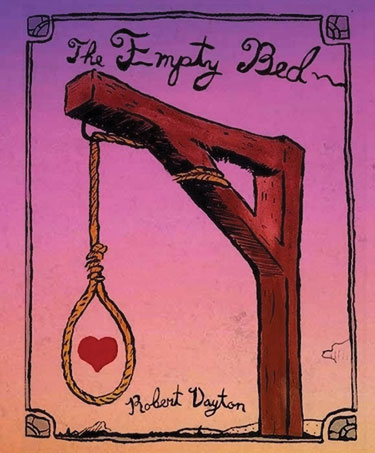
The Empty Bed
Robert Dayton, Impulse[b:],impulse-b.com, $20
Maybe it’s because I read this less than two weeks after a break up, but Robert Dayton’s post-break up book had me going through it.
The Empty Bed compiles drawings and writing about every thought, urge and feeling Dayton had after his relationship ended: sadness, self-doubt, horniness — it’s all in there. At times, it feels like a lot. The pages, with their bold, black handwritten lettering feel loud with pain and self-deprecation. Sometimes, I wanted to reach into the pages, grab Dayton by the shoulders, and say, “get ahold of yourself, man.”
It felt too honest, too exposed.
It’s almost a relief when you reach the quiet moments of the book, though they’re filled with emptiness and a hollow ache. Just as unexpectedly, the moments of levity, of jokes, of interludes come upon the scene — like one segment called “The ‘Deathwish’ Guide to Loss,” which talks about how film character Paul Kersey dealt with his grief in the super healthy way of shooting up bad guys (hey, whatever works).
There were moments when I felt disgusted, like when Dayton writes, next to a drawing of a sex doll, “No matter how much of your scent I put on this doll it still falls short.” Gross, dude.
And there are moments when I stared at a page for a full minute because the very words I’d once thought, but had never spoke aloud, were there, written out. Like a bizarre telepathy across time and pages.
If any of this sounds sentimental, it’s because sentimentality is at the core of The Empty Bed — nostalgia, after all, is what makes break ups so painful — but thankfully Dayton never veers into sappiness. (Not that this review won’t.)
My favourite part comes near the end, when Dayton dedicates several pages to an interview with his now-deceased mother, Margaret Dayton. It’s called “Divorce & Death” and in it Margaret talks about her divorce from her sons’ abusive father, and her eventual marriage to a good man.
I don’t know Margaret, and I don’t know her late husband, Bob — both of whom this book is dedicated to — but their relationship, coming after many pages of Dayton’s pain over losing someone he deeply loved, feels so tender and peaceful. Margaret, having been through divorce, and then outliving her husband by nine years, experiences empty beds over the course of her life, and that helps put Dayton’s empty bed in perspective. Not to say Dayton or anyone else’s pain is less great, but sometimes shared suffering help us heal.
There were parts of this book I could have done without. But it feels wrong to dictate to Dayton what parts of his break up to tell. Processing loss means dealing with all the good, the bad, the nasty and the vulnerability that comes with it. And as a reader, that means you can take what you need from this book, but it also means accepting the rest for what it is, even if it doesn’t speak to your own experience. At the end is a drawing of a large heart, which reads, “Put your heart to this heart so you can heal too.” So, I did. (Hey, I did say this might get sappy.) And it was just what I needed. So, thanks for sharing, Dayton. At the very least you helped me feel less alone.
